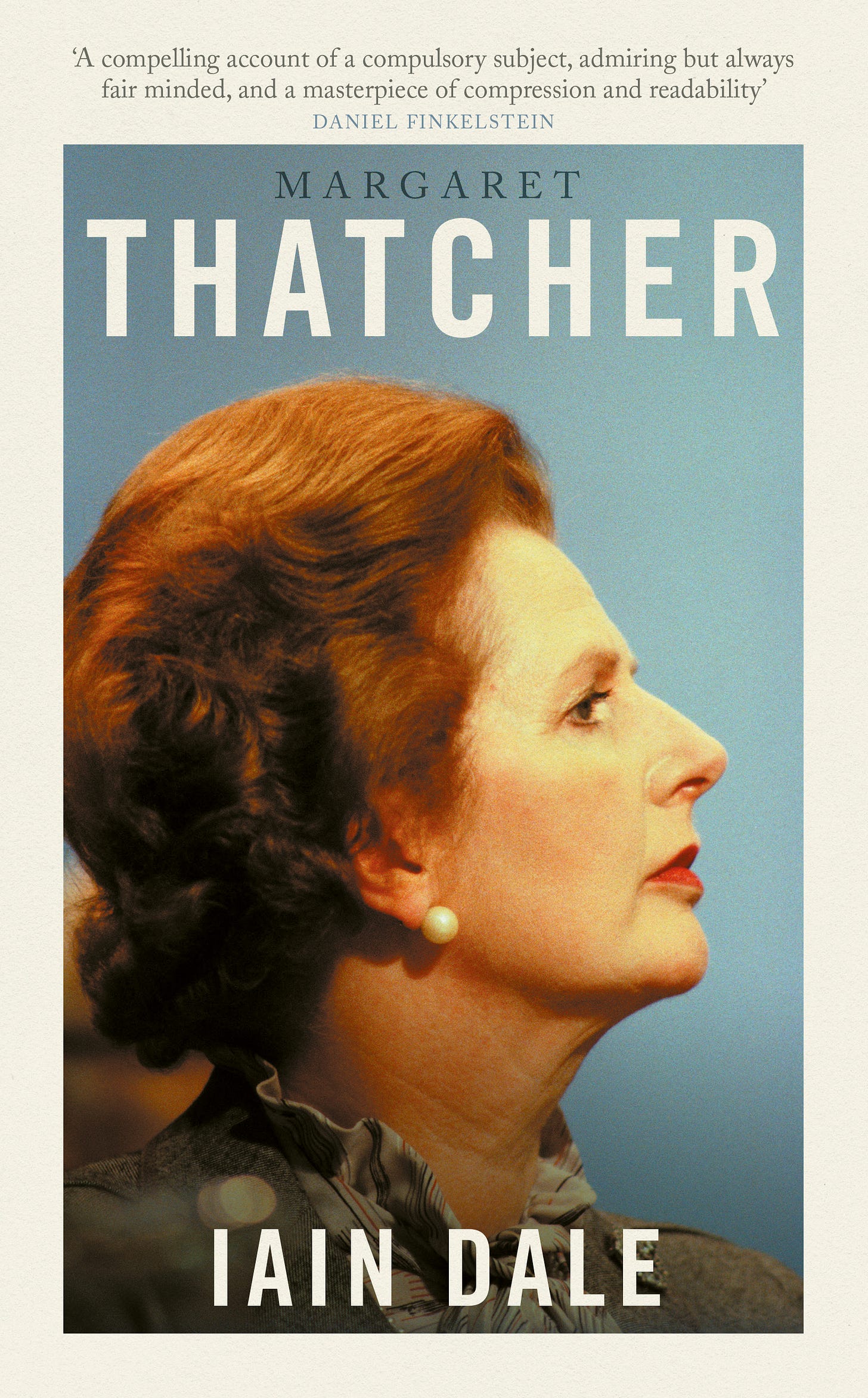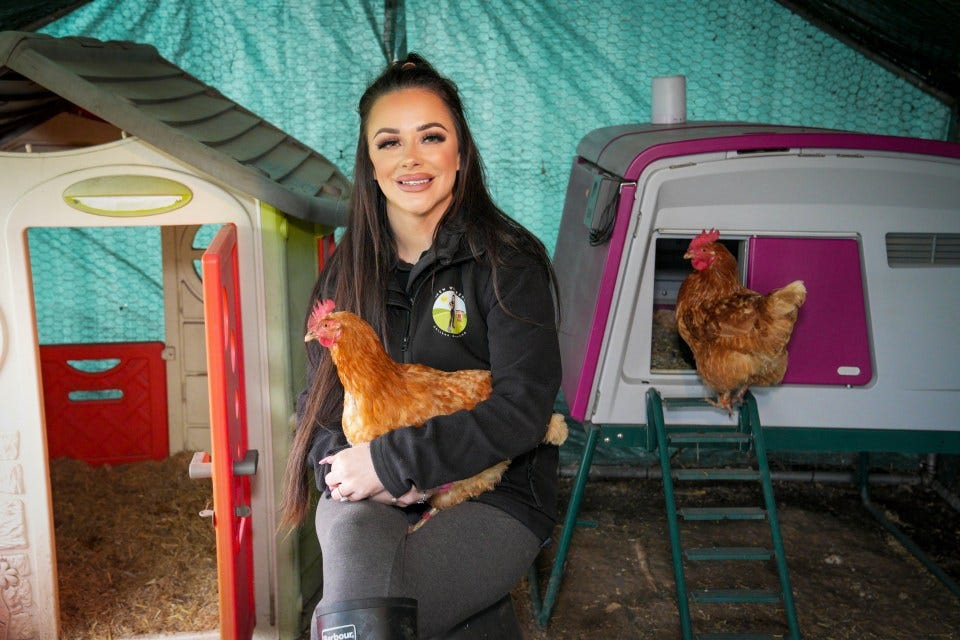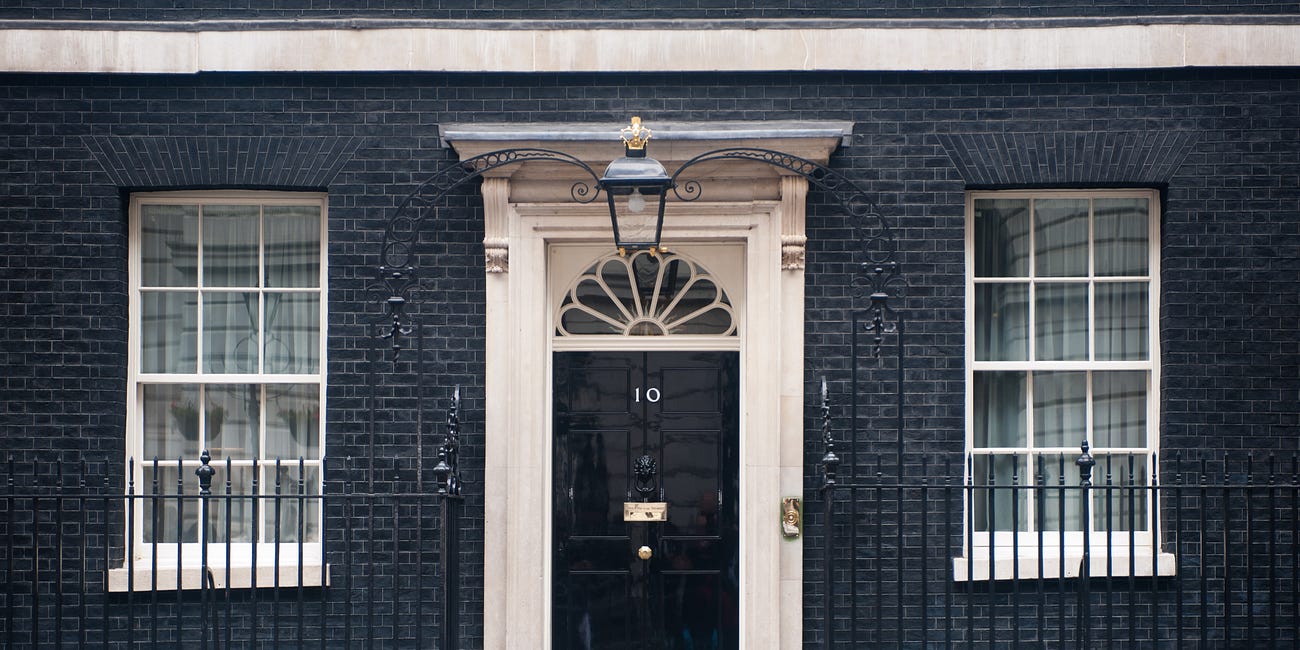Iain Dale on Margaret Thatcher
Plus a Kent chicken hotel, a pilgrimage along the River Medway, upcoming Kent events, and more
It’s difficult to argue that Margaret Thatcher is still a divisive figure, 35 years after she left office. Kent-based broadcaster Iain Dale has written a new biography about her for a new generation, so we’ve been talking to him about the process and her legacy. Further down, we talk to the owner of a chicken hotel who appeared on Dragon’s Den, learn about a pilgrimage along the River Medway, look at upcoming Kent events, and more.
Editor’s note: Thank you so much to everyone who sent incredibly kind and thoughtful messages following the passing of my dad last week. It’s been lovely to read them all. I’ve tried to reply to everyone, but please don’t take it personally if I've missed you given the volume I received. Today’s edition should have gone out over the weekend, hence the unusual Tuesday edition. After today, we’ll be back to our usual schedule with our regular news briefing on Thursday and a big interview on Saturday. -Ed.
Iain Dale on Margaret Thatcher
Iain Dale is a Kent-based broadcaster, political commentator and author. We spoke to him about his new biography of former Prime Minister Margaret Thatcher.
The definitive biography on Margaret Thatcher is a three-volume edition by Charles Moore. Iain Dale’s version is intended to be much more accessible. There is a great podcast about the life of Thatcher, as part of Iain’s podcast series on UK Prime Ministers. This short interview is to that podcast what Iain’s book is to Moore’s biography.
I ask Iain how he would describe Margaret Thatcher. “The greatest peacetime Prime Minister of the 20th century,” adding the peacetime caveat as “I think Churchill stands out on his own.” Iain classifies Prime Ministers of the 20th Century into one of two categories: “They're either weathervanes or signposts.” Atlee and Thatcher are “two that really knew exactly where they wanted to go and how they were going to get there.” For Iain, successful politicians need to have a strength of ideology, and although “neither Atlee nor Thatcher always stuck to the core ideology, I think all the voters knew that they believed in.” Whilst Iain feels that others had their own beliefs, they didn't manage to communicate them in the same way.
Iain has written and edited a number of books, but this is his first biography. He found the book challenging. “I thought because it's a very short book, I'd be able to write it off the top of my head and polish it off very quickly.” It didn't turn out like that at all. “It's much more difficult to write a short book, because you have to decide what to leave out.”
Publishers approached Iain to write the book, and his first instinct was to say no “because I don't think anyone can compete with the Charles Moore trilogy of biographies.” He decided to aim the book at a new generation, after having a conversation with his personal trainer. “He was 25 years old, and when he found out what I did for a living, his first question was ‘Margaret Thatcher, I've heard of her, but what did she do?’ He didn't even know she had been Prime Minister for 11 and a half years.”
While Iain wrote the book, he aimed it at him because “she left office 35 years ago. You have to be 56 years old to have voted for Margaret Thatcher. She's a distant memory and yet in many ways she dominates our politics today.” Iain explains that the Thatcher economic settlement has not changed, and her trade union reforms have not been rolled back by Labour governments since. “I really wanted to use it as a book to introduce her, not to write about every single detail. Nobody who is 25 is going to want to read 800 pages about anybody.” This book is 170 pages. If you enjoy it, then you can check out the Charles Moore.
What are the first things about Thatcher that come to Iain? “First of all, my niece was born in 1981. In 1988, I remember her saying to me, ‘Uncle Iain, can a man become Prime Minister?’ She was a person of significance, even to children at that time.” During her time as Education Secretary, when she became known as ‘Margaret Thatcher, the milk snatcher,’ because she abolished school milk, “I was at primary school then. I thought it was fantastic, because I hated the stuff.”
Thatcher’s reform of the economy is a significant part of Thatcher’s legacy, “because the economy was a basket case in 1979. Inflation was high, unemployment was rising, strikes, particularly in heavy industries. We were seen as a sick man of Europe by virtually every other country.” Iain also highlights Thatcher’s role in winning the Cold War. “She was the first one to identify Mikhail Gorbachev as a different Soviet leader. She introduced him to Reagan and was an intermediary through that time.”
“The Russians dubbed her the Iron Lady, and they couldn't have done her a greater favour because it enabled her to basically live off that for the rest of her political career.” Symbolically, the Falklands War was a real turning point because it was a difficult time, and her cabinet colleagues “had to sit her down and say, ‘There will be reverses, there will be British Armed Forces personnel that die.’ Her daughter Carol says that she would see her mother with tears running down her face, writing personal letters to each of the families of the soldiers that had been killed.” For Iain, the fact that Britain won that war sent a big signal to the rest of the world that Britain was back.
For some, Thatcher can be seen as a divisive figure, with policies that were not popular. “I'm seen as one of the keepers of the Thatcher flame, but I'm not blind to the fact that there were failures in the eleven and a half years.” These are outlined in the book, including the introduction of the poll tax, “probably the biggest failure,” and, for Iain, the main reason why she was ousted in 1990, “because people saw it as intrinsically unfair.”
The book does cover her post-political life from 1990 to 2013. “It wasn't a happy period.” Iain believes she suffered from a degree of PTSD. “She found it very difficult to come to terms with what happened.” She won three elections and felt that her cabinet had betrayed her. “I don't think there was a plot in the conventional meaning of that word, but she lost their confidence.”
In an upcoming Interview with Dr Tim Aker, who wrote his PhD on Thatcher, I asked him for a question to ask Iain. He asked, ‘Why do you think she didn't do more to promote supporters and friends within cabinet and within the party?’ “That is a great mystery, because he's absolutely right. She didn't.” For Iain, it was a big mistake consistently appointing Chief Whips who were not of “her type of conservatism. They were generally people who she would have described as wets.” Iain explains that after 11 and a half years, she didn't enjoy majority support in her cabinet. “Now, I can blame Chief Whips, but in the end, the buck stops with the Prime Minister. It was her fault. It's bizarre. In 15 years of leading the Conservative Party, she was almost the opposition in her own cabinet.”
The main question Iain is asked the most often is how would she have dealt with Donald Trump. “The answer to that question is I don't know.” ‘Would she have supported Brexit?’ “The answer, in theory, is I don't know, because how can we know?” Iain highlights how most of the people who knew her best think she would have voted remain because, “although she cultivated an image of being quite anti-Europe, if you actually look at what she did, quite a lot was pro-European.” Thatcher did become more Eurosceptic, particularly after she left Downing Street, but would she have actually voted to come out? “There is no evidence to support the view that she would.”
Margaret Thatcher by Iain Dale is available in bookshops. If you want a signed copy, you can order through Iain’s Polictos bookshop. Academic Professor Mary Beard reviewed it for the Observer and said, ‘I still hate her, but it was a really interesting read.’ Iain is currently working on his autobiography and has no plans to write another biography, “although I’ve always fancied having a crack at Sir Henry Campbell-Bannerman.”
What is a Chicken Hotel?
Katriona Shovlin is an alumnus of MidKent College and appeared on Dragon’s Den seeking investment in Hen Weekend, a chicken boarding enterprise in Upchurch, near Sittingbourne. We spoke to her to find out about it and her appearance on the show…
We get the crucial question out of the way first, asking exactly what a chicken hotel is. “It's a hotel for chickens,” Katriona replies. Cats go to catteries, dogs go to kennels. Hens go to Katriona.
The idea was hatched (really?-Ed) when Katriona could not get anybody to look after her chickens when she went on holiday. “I just thought there's got to be a gap in the market here.” She has had chickens since 2020 after looking after her neighbours. “They clocked on that I was literally just the other side of the hedge.” The chickens would sneak under the hedge and spend time with Kat, so the neighbour eventually agreed they should live with her, “and that's how I ended up chicken keeping in the first place.”
Kat has an animal background, having had various pets and studying Animal Care and Animal Management at MidKent College. She now lives in a rural setting with her seven-year-old. “I love chickens. I think in the society that we live in, they're just seen as a commodity, an egg layer or food. When you spend time with a chicken, they're endearing, clever, and not what people would expect.”
Kat has been able to allow a lot of space to the hen hotel. “There's two acres here, and flocks are never mixed.” Hens are territorial animals, and Kat ensures they never see a hen from outside their flock. “My largest hotel, I can take up to 20 at one time.” The only rule, and it’s a fairly significant one, is “no cockerels allowed, it's a female-only hotel.” Cockerels make a lot of noise, and Kat’s resident hens “probably wouldn't take too kindly to a male being on site.”
It also is no longer just for holidays, as Kat has started taking on hen social care cases. “I’ve had two hens since October,” after a house sale fell through and they needed emergency care. “I've got another flock of eight hens which have been here since January,” arranged by Kent County Council due to their owner’s wellbeing.
Kat works closely with the British Hen Welfare Trust, which “rescues hens from slaughter.” She also undertakes educational visits to nurseries and schools. “I take a hen with me so that they can see a rescue hen, and it steers them away from hatching projects, to be honest.”
Following the launch of the hen hotel, Kat appeared in regional, national, and international news, which led to her receiving a call inviting her to appear on Dragon’s Den. “The producer asked if I had ever thought about coming on. Absolutely not.” Before Kat knew what was happening, she was involved in due diligence. “I just thought, what better platform could I get than on the BBC?” While no investment was made then, Kat remains hopeful that further conversations could lead to future support.
If you have chickens and are looking for somewhere for them to stay whilst you are away, you can contact Kat via her website, Facebook and Instagram.
A pilgrimage along the Medway
The Friends of the River Medway are currently embarking on a pilgrimage along the river, so we spoke with Executive Director Zofia Page to find out more…
The Friends of The River Medway started five years ago as a group of people who wanted to look at how they could create long-term change for the river. This started with litter-picks at Forest Row, near the source of the river and led to a community of people passionate about finding a holistic perspective.
This is practical and about basic conservation, litter picks, invasive species removals, and understanding what actions can be individually taken, as well as collectively. They are citizen science practitioners, monitoring the river's health and building data. This encourages people to go out on the river and actually look at its state. This is done in partnership with Sussex University in a project called ‘Ripple Effect.’
They want to advocate for the rights of the River Medway. We spoke with Councillor Stuart Jeffrey about this for our sister title Local Authority. The group seek to reimagine and reshape our relationship with the river, rooted in a way that is ancient and still relevant in indigenous cultures around the world, where the river is seen as something sacred and to be respected, rather than a place for our sewage, or our trolleys.
The pilgrimage began on 19 July at Willwood Reservoir. The walking pilgrimage is planned to finish in Chatham at Sun Pier House on 26 July, where there will be an art exhibition, titled ‘The Medway is our Muse.’ On 27 July, the group encourages people to join them on a Jetstream Tour to the Isle of Grain, where the Medway joins the Estuary. They also have a crowdfunder should you wish to support their efforts.
Upcoming Kent events
🎭 Until 9 Aug - Canterbury Shakespeare Festival // Varied lineup of Shakespeare plays from well-known productions to more experimental experiences. Gulbenkian Theatre, Canterbury. Various prices.
🛞 Sun 27 Jul - Monster Slam // Monster truck demonstrations, stunt shows, motorcross, and entertainment. Quex Park, Birchington. Tickets £20.
🎸 Wed 30 Jul - Deerhoof // Legendary American indie band come to the seaside. The Lido, Margate. Tickets £20.
✏️ From 1 Aug - Herne Bay Cartoon Festival // 12th edition of the UK’s only cartooning festival, featuring work from 20 professional cartoonists. Beach Creative, Herne Bay. Free.
🎉 Sun 3 Aug - Margate Carnival // Parade of performance, entertainment, and celebration. Margate Seafront. Free.
More Currents
Last week, we welcomed former KM Political Editor Paul Francis to the Kent Current, where he will write occasional columns for us. In his first edition, he looked at the highs and lows of Labour’s first year in office.
Paper anniversary
Former KM Political Editor Paul Francis on the highs and lows of Labour's first year in office.
After today, we’ll be resuming our usual schedule, with our regular news briefing edition following on Thursday and a big interview following on Saturday.
Footnotes
Follow us on social media! We’re on Facebook and BlueSky for now.
If you enjoy Local Authority, please share it with your friends, family, associates, and enemies. We have no meaningful marketing budget, so we rely on word of mouth from our readers to find new readers.






I don't usually nitpick because you do great work, but Thatcher left office the year I was born. I wish I could say I'm 25, but alas I'm 35 😩